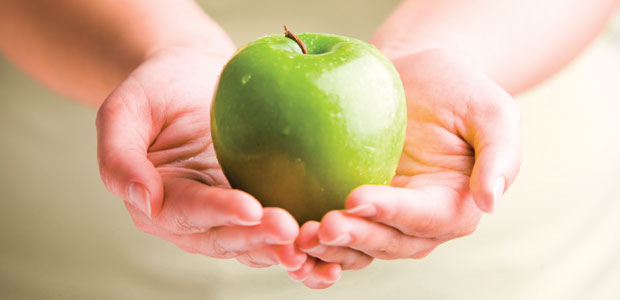Advertisement
Understanding Bowel Disorders
Part 2 - IBS & more

Apparently mother was right about that apple a day. For good and ill, what we eat and how we live are central to the onset and control of irritable bowel syndrome and diverticulosis.
In the second of a two-part series on bowel disorders, this month alive looks at irritable bowel syndrome (IBS) and diverticulosis. These two commonly diagnosed bowel disorders not only share some common symptoms–cramping, abdominal pain, and bloating–but both are influenced by North America’s fast food style.
Irritable Bowel Syndrome
IBS is the most diagnosed gastrointestinal disorder in the world. Fully 20 percent of North American adults have reported symptoms. The condition tends to affect women more often than men and usually appears in middle age, though it does occur in the elderly and, more rarely, in children.
The origins of IBS are unknown but the medical mantra is the same for all sufferers: change the diet. More fibre can help those with constipation-dominant IBS. Probiotic bacteria can improve gastrointestinal health. Considerable research has shown that probiotic-rich yogourt, miso, fortified juices, and soy beverages relieve symptoms or even delay recurrence in both constipation- and diarrhea-dominant IBS. Early studies also indicate that probiotics may be particularly useful to control diarrhea in children with IBS.
The cause of IBS is unknown and researchers continue the hunt for a cure. Scientists are studying possible biological causes, such as the effect of bacterial infections on the gastrointestinal tract or possible links between IBS and celiac disease. Geneticists continue to look for genes that make individuals more susceptible to IBS. One intriguing study collected data from 900 twin pairs. The results suggest some genetic influence, which has sparked new rounds of research.
European researchers seem especially interested in the mind-body connection as a cause for IBS. A large study of IBS-diagnosed patients demonstrated that this population was 60 percent more prone to migraine, fibromyalgia, and depression than people without IBS. The researchers did not draw conclusions from these results; however, they agreed with other scientists who report patient improvement when anxiety and depression are treated along with physical symptoms. Likewise, an American study has demonstrated a link between violence and stress in relation to IBS, chronic fatigue, and fibromyalgia.
Diverticulosis and Diverticulitis
Diverticulosis (the presence of abnormal bulges–diverticula–in the wall of the small intestine) was unknown before the advent of readily available low-fibre, highly processed foods. Researchers at Yale University Medical School hypothesize that insufficient dietary fibre suppresses the colon’s immune response, thereby creating an environment favourable to low-grade chronic inflammation. Left untreated, microperforations may occur along the wall of the diverticulum. If the diverticula become infected or inflamed, the condition is called diverticulitis.
Diverticulosis is a distinctly Western disease, afflicting older and obese populations. About half of the over-60 population have the condition. Obesity not only contributes to developing diverticula but it also increases the chance that the condition will be more severe.
Most people can avoid formation of diverticula by ingesting insoluble fibre regularly. The American Dietetic Association recommends 20 to 35 g of fibre daily for adults and 5 g daily for children. For many years, doctors warned patients with diverticulosis to avoid nuts, popcorn, and seeds, but there is scant scientific evidence to support this recommendation. Current medical thought now includes these once-forbidden foods as part of a healthy, high-fibre diet.
Have a Little Bran With Your Apple
Current research on IBS and diverticular disease reinforces the relationship between diet, lifestyle, and long-term health. Simply increasing consumption of whole grains, fruits, and vegetables may be enough to prevent diverticula from forming. Adding probiotics may help to maintain healthy intestinal flora. Finally, if researchers are correct, less stress will lead to a healthier gut.




